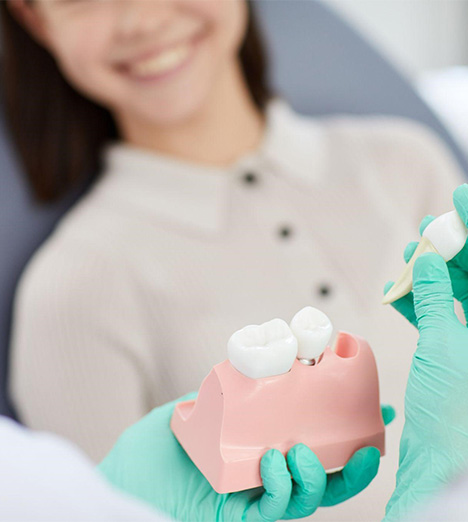
EXTRACTIONS
Having a tooth pulled, known as a tooth extraction in the dental world, can cause significant anxiety in some patients during the lead-up to the appointment. However, Dr. Smith is a highly skilled dental care provider who puts the patient first. He has the experience to make sure your extraction procedure goes smoothly, and you’ll soon be breathing a sigh of relief that you’re finally pain-free.
There are two types of tooth extractions: simple extractions and surgical extractions. Depending on your circumstances and preferences, one type of extraction will be a better option than the other.
Simple extractions do not require full anesthesia and are used when the tooth is already above the gum line (you can see it in your mouth). In these cases, Dr. Smith will use specialized dental instruments to loosen and then pull out the affected tooth. You won’t need any stitches for a simple tooth extraction.
For more complicated cases or when the tooth hasn’t emerged from the gums yet, you’ll need a surgical extraction. This is the type of extraction used for wisdom teeth that haven’t grown all the way in yet. For a surgical extraction, Dr. Smith will make an incision on your gums and then pull out the target tooth in one or more pieces. In most cases, we will administer general anesthesia for the surgery, so patients are unconscious and free from pain throughout the procedure. Since this is a more involved procedure, this type of extraction requires a more significant recovery process than a simple extraction.
There are many reasons why a tooth extraction might be necessary, with the most common being severe tooth decay. Here are some of the most common reasons why our dentist might recommend an extraction:
Decaying teeth. Plaque, a build-up of bacteria, can solidify into tartar that causes cavities and tooth decay. Teeth that have extensive decay can become too damaged to save with fillings or crowns and must be extracted from the mouth for health and pain reasons.
Gum disease. When you have gum disease, your gums can wear down and leave your tooth exposed. Bacteria can build in these areas and damage your teeth. Gum disease can even lead to your teeth becoming loose and painful, making tooth extractions an effective solution.
Broken teeth. Whether from an intense impact or just an unfortunate bite down onto a hard piece of food, teeth can sometimes break or fracture. When damage is too severe for restorative dental work, we can extract the tooth to make room for a new implant as a replacement.
Crowded teeth. Patients may have teeth pulled to make room for braces and other orthodontia if they have a small mouth. When teeth are crowded together in too small of a space, it can result in crooked teeth, bite problems, and pain.
Wisdom teeth. Wisdom teeth are molars in the very back of your mouth that don’t emerge from the gums until the late teen years, if at all. Some people aren’t born with a full set of wisdom teeth. Because these teeth may not have room to grow in properly and can risk the health of surrounding teeth through impact, many people get these molars extracted as older teenagers or young adults.
Simple extractions are performed when a tooth is above the gumline, meaning you can see it in your mouth, and do not require sedation or stitches. Surgical extractions are performed when a tooth has not yet emerged from the gums. These extractions are more involved and are typically performed on patients under general anesthesia. They may also require stitches. Simple extractions are what people typically think of as getting a tooth pulled, whereas a surgical extraction requires that your dentist make an incision in your gum line to remove the tooth.
There are a number of reasons why an oral extraction may be recommended by your dentist. This procedure is commonly performed for a wisdom tooth removal. These extra teeth are unnecessary and can cause pain, infection, crowding, gum disease, and other serious issues over time if not removed. Other frequently-seen reasons for extractions include tooth decay, trauma, impaction, overcrowding, and more.
This depends entirely on your specific situation and the reason for the procedure. For wisdom teeth extractions, the number ranges from one to four, as people may grow between zero and four wisdom teeth, and not all may need removal.
After you’ve had a tooth extracted, you’ll want to take it easy for a few days. Avoid eating or drinking anything for several hours following the procedure. Then stick to soft foods and fluids for the next three or more days (and avoid straws, as those could dislodge the blood clot). Wait around 12 hours to brush or rinse your teeth, and then only do so very gently.
Oral extractions may be performed by a trained dentist, a dentist with surgical expertise, or an oral surgeon. At our dental office, all oral extractions are performed by Dr. Smith himself, who has been providing high-quality dental services including extractions for nearly 30 years.
This is based on the reason for extraction and the specific insurance plan you have, but the answer is commonly yes. Call your insurance provider to find out your exact policy, or contact our office and we can provide assistance.
TOOTH EXTRACTION
For nearly 30 years, Dr. Douglas F. Smith, DDS has been providing Logan residents with high-quality dental services, including preventative, cosmetic, restorative, pediatric, and other care. At our Logan dental office, you’ll experience friendly, welcoming, and compassionate service without the stress, rush, or upselling that can exist at other dental clinics. We know that your appointment experience is better when you feel safe and listened to, and we strive to provide excellent customer service to every one of our patients. Contact us today with questions or to set up an appointment for extractions.
